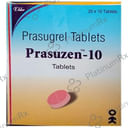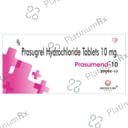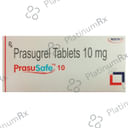Prasugrel
Uses
Prasugrel is used for heart attacks, prevention of heart attacks and strokes, and unstable angina. It reduces the risk of experiencing another heart attack, stroke, or blood clots in stents in patients who have already undergone angioplasty due to severe heart-related chest pain (unstable angina) or a heart attack.
How it Works
How Prasugrel works Prasugrel is an antiplatelet medication that prevents platelets from sticking together, thereby reducing the formation of harmful blood clots. This action lowers the risk of experiencing another heart attack or stroke.
Side Effects
Common side effects of Prasugrel include headache, dizziness, high blood pressure, hypotension (low blood pressure), atrial fibrillation, edema (swelling), dyslipidemia, gastrointestinal disturbances, blood cell abnormalities, and gastrointestinal bleeding.
Expert Advice
- For optimal results, take Prasugrel at the same time every day.
- Prasugrel increases your risk of bleeding.
- Exercise caution while shaving, using sharp objects, or cutting fingernails and toenails.
- Do not discontinue the medication without consulting your doctor, as this may elevate your risk of having another heart attack or stroke.
- If you are scheduled for surgery or dental treatment, you may be advised to temporarily stop taking Prasugrel.
- You have been prescribed Prasugrel to help prevent blood clots.
Other Combinations
Aspirin + Prasugrel
Related Medications
Prasugrel 10mg

₹279

₹152.5
MRP ₹305
Prasugrel 10mg

₹184

₹152.5
MRP ₹305
Prasugrel 10mg

₹2,002

₹152.5
MRP ₹305
Prasugrel 10mg

₹220

₹152.5
MRP ₹305
Prasugrel 10mg

₹191.4

₹152.5
MRP ₹305
Prasugrel 10mg

₹195

₹152.5
MRP ₹305
Prasugrel 10mg

₹140

₹152.5
MRP ₹305
Prasugrel 10mg

₹270

₹152.5
MRP ₹305
Prasugrel 10mg

₹192

₹152.5
MRP ₹305
Prasugrel 10mg

₹94

₹152.5
MRP ₹305
Prasugrel 10mg

₹202.8

₹152.5
MRP ₹305
Prasugrel 10mg

₹94.9

₹152.5
MRP ₹305
Prasugrel 10mg

₹262

₹152.5
MRP ₹305
Prasugrel 10mg

₹243

₹152.5
MRP ₹305
Prasugrel 10mg

₹200

₹152.5
MRP ₹305
Prasugrel 10mg

₹198

₹152.5
MRP ₹305
Prasugrel 10mg
₹320

₹152.5
MRP ₹305
Prasugrel 10mg

₹76

₹152.5
MRP ₹305
Prasugrel 5mg

₹113.5

₹65.2
MRP ₹130.3
Prasugrel 5mg

₹79

₹65.2
MRP ₹130.3
Prasugrel 5mg

₹105.1

₹65.2
MRP ₹130.3
Prasugrel 5mg

₹109.2

₹65.2
MRP ₹130.3
Prasugrel 5mg

₹64.8

₹65.2
MRP ₹130.3
Prasugrel 5mg

₹130

₹65.2
MRP ₹130.3
Prasugrel 150mg

₹179
Flat ₹100 off on first app order | Use Code: APP100 |
Flat ₹100 off on first app order
USE CODE: APP100

Download Now